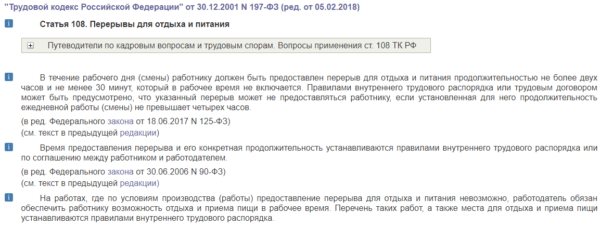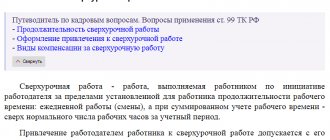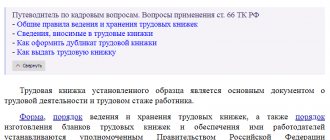Shift work schedules often include night work. For the employee, such work carries an increased burden, therefore, the payment for it should be higher. Employees are often concerned about the issue of pay during shift work, in particular when they are busy at night.
Let's consider how the laws of the Russian Federation relate to this issue, how accounting occurs when working outside of normal hours, how to calculate payment, and we will show this with a specific example.
How to establish shift work in an organization ?
The law allows you to work at night
Despite the fact that most organizations operate during the day, the specifics of certain types of work require night (and sometimes round-the-clock) operation. Just for such enterprises, there is a shift work schedule, according to which part of the shift or the entire shift falls during hours usually intended for sleep and rest.
The regulations for the organization and payment of such work are prescribed in Art. 96 and 154 of the Labor Code of the Russian Federation.
Is payment for night work included in wages in order to correlate it with the minimum wage?
Summarizing
Working on the night shift is not always convenient or pleasant for the employees themselves. But modern society needs people who serve at night: doctors, rescuers, pharmacists, convenience store clerks, law enforcement officers and other representatives of various professions.
Therefore, night shifts are paid higher than similar work performed during the day. In addition, night workers have the right to proper rest, which somewhat compensates for off-hour work. The main thing is to know your rights and understand that working on night shifts is much more difficult than day shifts, takes up more resources, and therefore requires more pay and attention from management.
Night work is paid higher than day work
Which shifts are considered night shifts?
The law declares night work hours to be from 10 p.m. (10 p.m.) to 6 a.m.
A shift will be considered a night shift if at least half of it consists of work within the specified time period. Payment at the night rate will be only for the hours that make up this period; the rest will be rewarded, as is customary in day shifts. The definition of “night shift” in this case is significant for deciding the issue of attracting or not attracting a certain category of employees.
ATTENTION! According to Art. 96 of the Labor Code of the Russian Federation, the night shift should be 1 hour shorter than the corresponding day shift.
The night shift is not reduced by an hour in certain special cases, namely:
- the employee was specifically hired for night work, and this is reflected in the employment contract;
- the employee has a reduced schedule;
- The shift schedule is based on a 6:1 scheme;
- when the shift cannot be shortened due to the nature of production.
Question: How to pay for overtime work at night when recording working hours with a long accounting period (for example, a quarter)? View answer
Night work: rest
Article No. 108 of the Labor Code of the Russian Federation regulates the organization of rest for employees working night shifts. First of all, the code of laws stipulates the time for eating. The employer must allow the employee to have a snack within a time period of at least thirty minutes. At the same time, organizing the process of rest and meals falls on the shoulders of the authorities. In other words, an employee should be able to have a snack right at the enterprise or, if he brings food with him, use a kitchen organized in the premises where the work shift takes place.

Article 108. Breaks for rest and meals of the Labor Code of the Russian Federation
As for days off and rest from work, everything is ambiguous here. Previously, the model was adopted: “Shift - sleep - day off - shift,” meaning that after night work a person is given two days to rest. The first one is to get some sleep, the second one is to be able to solve problems during the daytime. Now this model is not universal.
There are two rules. First, two night shifts in a row are prohibited for one employee; this rule applies to those who work both day and night. For workers who only work night shifts, it is impossible to schedule two nights in a row. That is, it is impossible to organize the labor process in such a way that a person goes out “at night,” goes home in the morning, and in the evening he is expected back at his workplace. We remind you that a person cannot work more than forty “night” hours per month - this right of employees is enshrined in law.
Documents on payment for night work
An enterprise must necessarily regulate the conditions for organizing and calculating remuneration for work outside normal hours. This should be implemented in the following local acts:
- in the regulations on wages (general or issued specifically for night hours);
- in the collective agreement (the opinion of the trade union body must be taken into account)
- in an employment contract with an individual employee;
- in the order to attract an employee to work at specified hours (if this is done one-time or an employee is attracted from a special contingent).
IMPORTANT! An order is necessary only in special cases; with a permanent schedule with night shifts, it is enough to fix the payment procedure in the Regulations.
How night work is paid: actual additional payments for work in industries
In the current practice of paying for work at night, in many industries industry agreements are used, which establish a surcharge coefficient of 40% (federal industry agreement on the road sector, mechanical engineering complex, etc.).
And although this contradicts the literal reading of the norm of the Labor Code of the Russian Federation, which indicates that the source of establishing additional pay can be a collective agreement, it is important to understand that the agreement protects the rights of the employee and will certainly be taken into account in the event of a labor dispute.
How to pay for a night shift worked by an employee on a holiday or day off? The answer to this question is in ConsultantPlus. Get trial access to the system and get the opinion of K+ experts for free.
Special contingent of personnel
Certain categories of employees do not have the right to work night shifts, without taking into account their opinion on this matter. Another list defines the circle of workers who can be involved in night work if they express their consent.
It is prohibited to work at night:
- women expecting a baby;
- minor workers, except for special categories provided for by the Labor Code of the Russian Federation and certain federal laws, for example, those involved in performances or other events.
You can work at night with written consent:
- mothers of young children (under 3 years old);
- disabled people of any group;
- employees who care for disabled people;
- workers caring for unhealthy family members (according to medical opinions);
- single parents with children under 5 years of age;
- guardians of children under 5 years of age.
FOR YOUR INFORMATION! An employee belonging to this category must be warned in writing that he has the right to refuse to work at night, and in turn, have his consent endorsed.
Who cannot work at night
The circle of people who are not allowed to work shifts at night is regulated by law. This is a fairly extensive list of citizens who have the right to refuse a boss who invites them to work after hours, without fear of being fired due to violation of obligations.
Citizens exempt from night work:
- Pregnant women.
- Women who have a child under three years of age.
- Men and women. Having children with disabilities.
- Raising children under five years of age alone.
- Are guardians of children of the specified age.
At the same time, the law makes amendments for representatives of certain professions. Thus, journalists, film, television, circus workers, participants in creative processes, people involved in the creation of works of art and similar employees can work at night, regardless of their membership in the above list. The procedure for their work in this situation is regulated by labor and collective agreements, local acts and the decision of the commission regulating social and labor relations. Athletes are also included in this list.

Not every person can be hired by an employer to work at night.
Logically, it turns out that the list allows, if desired, citizens belonging to all categories to work. For example, minor actors or circus performers, Paralympians may well work after hours by signing an agreement on paper (not just agreeing verbally, but by signing a document in which they indicate that they are familiar with their right to refuse night work, but are ready to her).
The only ones who cannot work at night under any circumstances are the young ladies in an interesting position. A woman, having learned about pregnancy, has the right to immediately inform her superiors by presenting a medical certificate. Night work is considered a serious stress for the body of the expectant mother, so the employer must immediately transfer the woman to the same job, only during the daytime. If a day shift is not provided, the pregnant woman is looking for another occupation. If one is not found, the woman is released from work while maintaining her wages.

Pregnant women are not allowed to work night shifts
Factors determining the amount of pay for night shifts
The law establishes increased pay compared to daytime hours for each hour worked at night. The size of this increase depends on several important nuances:
- the minimum wage for night work established by the state;
- numbers set out in the relevant local act (usually the additional payment is a percentage of the daily salary or tariff);
- the number of night hours during which the employee was busy.
The amount of additional payment for each night hour of work cannot be less than a fifth of the regular daily salary (Article 154 of the Labor Code of the Russian Federation, Decree of the Government of the Russian Federation of July 22, 2008 No. 554).
NOTE! A shift schedule or a regular schedule is accepted in the organization; night hours are paid according to the same principle - with an additional payment.
Night work procedures for creative workers
If the work is related to creative activity, then special rules establishing the regime apply. Government Resolution No. 252 contains data on which occupation relates to it. It contains about 200 positions.
To use special norms of the Labor Code, it is required that the position in the employment agreement completely coincides with the position contained in the resolution. It is important for the administration and employees of such teams to constantly monitor this list. The resolution may be amended to either expand or shorten the list. These circumstances may result in new labor regulation conditions.
Author of the article
Night on a business trip
If an employee must work at night while on a business trip, this does not change the mandatory additional payment. The only difference is that the employer is not obliged to pay extra for night hours spent on the way to the business trip, although he can do this on his own initiative and desire.
How is a flight paid at night if an employee returns from a business trip on a day off and the flight is partially carried out at night?
What if it's overtime?
It’s one thing when night hours are included in the work schedule, and a slightly different situation when they end up being worked beyond the norm, even with a shift schedule. How to make payment in such cases?
It is necessary to apply both the extra pay per night and the overtime factor, which is 1.5 for the first two hours of overtime and 2 for the subsequent time.
Constitutional Court of the Russian Federation dated April 11, 2019 No. 17-P: Minimum wages, overtime, holidays and night
Share
The employee was paid a salary (taking into account salary and payments for overtime work, work at night, on weekends and holidays) in an amount not less than the minimum wage in the region.
The courts have recognized that wages must be no less than the minimum wage (or the minimum wage in a constituent entity of the Russian Federation), after which a regional coefficient and a percentage increase are applied to it.
The Constitutional Court of the Russian Federation did not agree with this.
If we calculate wages in this way, the monthly wages of workers involved in work in conditions deviating from normal (night time, overtime, weekends and non-working holidays) would not differ from the wages of persons working under normal conditions.
The establishment of increased pay for such types of work is due to the employee’s increased labor costs caused by a reduction in rest time or work at a time that is not biologically intended for active work.
Thus, the interrelated provisions of Article 129, parts one and three of Article 133 and parts one - four and eleven of Article 133.1 of the Labor Code of the Russian Federation, in their constitutional and legal meaning in the system of current legal regulation, do not imply inclusion in wages (parts of wages) employee not exceeding the minimum wage, increased pay for overtime work, night work, weekends and non-working holidays. In principle, the same as the regional coefficient and the percentage premium (Resolution of the Constitutional Court of the Russian Federation of December 7, 2017 No. 38-P).
Resolution of the Constitutional Court of the Russian Federation of April 11, 2019 N 17-P
“In the case of verifying the constitutionality of the provisions of Article 129, parts one and three of Article 133, as well as parts one, four and eleven of Article 133.1 of the Labor Code of the Russian Federation in connection with the complaint of citizen S.F. Zharova"
The Constitutional Court of the Russian Federation, composed of Chairman V.D. Zorkin, judges K.V. Aranovsky, A.I. Boytsova, N.S. Bondar, G.A. Gadzhieva, Yu.M. Danilova, L.M. Zharkova, S.M. Kazantseva, S.D. Knyazeva, A.N. Kokotova, L.O. Krasavchikova, S.P. Mavrina, N.V. Melnikova, Yu.D. Rudkina, O.S. Khokhryakova, V.G. Yaroslavtseva,
guided by Article 125 (part 4) of the Constitution of the Russian Federation, paragraph 3 of part one, parts three and four of Article 3, part one of Article 21, articles 36, 47.1, 74, 86, 96, 97 and 99 of the Federal Constitutional Law “On the Constitutional Court of the Russian Federation” Federation",
considered at a meeting without a hearing the case on checking the constitutionality of the provisions of Article 129, parts one and three of Article 133, as well as parts one, four and eleven of Article 133.1 of the Labor Code of the Russian Federation.
The reason for considering the case was a complaint from a citizen, full name. The basis for considering the case was the revealed uncertainty regarding the question of whether the legal provisions challenged by the applicant comply with the Constitution of the Russian Federation.
Having heard the report of the judge-rapporteur V.G. Yaroslavtsev, having examined the presented documents and other materials, the Constitutional Court of the Russian Federation
installed:
According to Article 129 of the Labor Code of the Russian Federation, which reveals the content of the basic concepts used in regulating wages, wages (employee remuneration) are recognized as remuneration for labor depending on the qualifications of the employee, the complexity, quantity, quality and conditions of the work performed, as well as compensation payments (additional payments and allowances of a compensatory nature, including for work in conditions deviating from normal, work in special climatic conditions and in areas exposed to radioactive contamination, and other payments of a compensatory nature) and incentive payments (additional payments and allowances of an incentive nature, bonuses and other incentive payments) (part one); tariff rate - a fixed amount of remuneration for an employee for fulfilling a standard of work of a certain complexity (qualification) per unit of time, without taking into account compensation, incentives and social payments (part three); salary (official salary) - a fixed amount of remuneration for an employee for the performance of labor (official) duties of a certain complexity for a calendar month without taking into account compensation, incentives and social payments (part four); basic salary (basic official salary), basic wage rate - minimum salary (official salary), wage rate of an employee of a state or municipal institution carrying out professional activities in the profession of a worker or position of an employee, included in the corresponding professional qualification group, excluding compensation, incentives and social payments (part five).
Part one of Article 133 of this Code provides that the minimum wage is established simultaneously throughout the entire territory of the Russian Federation by federal law and cannot be lower than the subsistence level of the working population, and part three of the same article establishes the rule according to which the monthly salary of an employee , who has fully worked the standard working hours during this period and fulfilled the labor standards (job duties), cannot be lower than the minimum wage.
By virtue of Article 133.1 of the said Code, in a constituent entity of the Russian Federation, a regional agreement on the minimum wage may establish the amount of the minimum wage in a constituent entity of the Russian Federation (part one) for employees working on its territory, with the exception of employees of organizations financed from the federal budget (part two ); the amount of the minimum wage in a constituent entity of the Russian Federation is established taking into account socio-economic conditions and the cost of living of the working population in it (part three) and cannot be lower than the minimum wage established by federal law (part four); the monthly salary of an employee working in the territory of the relevant constituent entity of the Russian Federation and who is in an employment relationship with an employer in respect of whom the regional agreement on the minimum wage is valid in accordance with parts three and four of Article 48 of this Code or to whom the said agreement is extended in the manner established by parts six to eight of Article 133.1 of this Code, cannot be lower than the minimum wage in this constituent entity of the Russian Federation, provided that such employee has fully worked the standard working hours during this period and fulfilled labor standards (job duties) (part eleven).
The applicant in this case, citizen Full Name, working as a watchman in a joint stock company, was given a salary of 4,268 rubles, a regional coefficient and a percentage increase in wages for work in areas equivalent to the regions of the Far North, as well as other allowances and additional payments provided for by local regulations employer. Payment for overtime work, work at night, on weekends and non-working holidays was made in an increased amount based on the established salary. Since the applicant’s official salary was set at an amount below the minimum wage in the Irkutsk region, the calculation of wages was carried out on the basis that the amount of wages took into account the salary and all payments, including payment for overtime work, work at night, on weekends and non-working days holidays, must be no less than the minimum wage (the regional coefficient and percentage bonus were calculated for the entire amount of wages). Believing that the employer's payroll practices violated his rights to receive fair wages, the applicant filed a lawsuit.
By the decision of the Bodaibo City Court of the Irkutsk Region dated April 18, 2021, the requirements of the full name were partially satisfied. The court considered that the minimum wage established by the Regional Agreement on the Minimum Wage in the Irkutsk Region dated January 26, 2021 (12,652 rubles) should be taken as the basis for wages in 2021, and in January 2021 in connection with the termination of the said agreement — the minimum wage established at the federal level (9,489 rubles), on the basis of which it is necessary to calculate payment for actually worked time according to the duty schedule, after which the amount of payment in the increased amount for overtime work, night work, and weekends should be added to the amount received and non-working holidays (in those months when it was carried out) and calculate the regional coefficient and percentage increase in wages.
By the appeal ruling of the judicial panel for civil cases of the Irkutsk Regional Court dated August 2, 2021, the decision of the first instance court was changed, the amount to be recovered in favor of the full name was reduced. In this case, the court proceeded from the fact that the employee’s wages , including all compensation and incentive payments provided for by the wage system, as well as increased wages in conditions deviating from normal ones, must be no less than the minimum wage (or the minimum wage in a subject of the Russian Federation), after which a regional coefficient and a percentage premium are added to it .
According to the applicant, the provisions of Article 129, parts one and three of Article 133, as well as parts one, four and eleven of Article 133.1 of the Labor Code of the Russian Federation do not correspond to Articles 7, 17, 19, 37 and 55 of the Constitution of the Russian Federation, since according to the meaning given them by law enforcement practice, they allow the employer to set the employee a salary, the amount of which, taking into account the inclusion of compensation for work in hazardous working conditions, payment for overtime work, work at night, on weekends and non-working holidays, does not exceed the minimum wage in the Russian Federation, which violates his right to increased wages in conditions deviating from normal ones.
In accordance with Articles 74, 96 and 97 of the Federal Constitutional Law “On the Constitutional Court of the Russian Federation”, the Constitutional Court of the Russian Federation, upon a citizen’s complaint about a violation of his constitutional rights and freedoms, verifies the constitutionality of the law or its individual provisions to the extent that they were applied in the applicant’s case, the consideration of which has been completed in court, and makes a decision only on the subject specified in the complaint, assessing both the literal meaning of the legal provisions being tested and the meaning given to them by official interpretation or established law enforcement practice, as well as based on their place in the system of legal norms , without being bound when making a decision by the grounds and arguments set out in the complaint.
As follows from the court decisions adopted in the applicant’s case, he did not work in hazardous working conditions, and corresponding payments are not provided for him.
Thus, the subject of consideration of the Constitutional Court of the Russian Federation in the present case is the interrelated provisions of Article 129, parts one and three of Article 133 and parts one - four and eleven of Article 133.1 of the Labor Code of the Russian Federation to the extent that on the basis of these norms the issue of inclusion in the salary (part of the salary) of an employee that does not exceed the minimum wage, increased payment for overtime work, work at night, weekends and non-working holidays .
The Constitution of the Russian Federation, declaring Russia a legal social state, the policy of which is aimed at creating conditions ensuring a decent life and free development of people, stipulates that in the Russian Federation the labor and health of people are protected, everyone has the right to remuneration for work without any discrimination and not lower than the minimum wage established by federal law (Article 1, Part 1; Article 7; Article 37, Part 3).
The right to fair wages and equal remuneration for work of equal value without distinction of any kind is recognized as one of the most important rights in the world of work by the Universal Declaration of Human Rights (Article 23), the International Covenant on Economic, Social and Cultural Rights (Article 7), as well as the European Social Charter (revised), adopted in the city of Strasbourg on May 3, 1996 (Article 4 of Part II).
By virtue of the above provisions of the Constitution of the Russian Federation and international legal acts, the legal regulation of remuneration for persons working under an employment contract must guarantee the establishment of wages in an amount determined by objective criteria reflecting the qualifications of the employee, the nature and content of his work activity and taking into account the conditions of its work implementation, which together determine the amount of money paid to the employee necessary for the normal reproduction of the labor force. At the same time, determining the specific amount of wages should not only be based on the quantity and quality of labor, but also take into account the need for a real increase in wages when working conditions deviate from normal (resolutions of the Constitutional Court of the Russian Federation dated December 7, 2021 N 38-P and dated 28 June 2018 N 26-P; Determination of the Constitutional Court of the Russian Federation of December 8, 2011 N 1622-О-О).
According to part one of Article 129 of the Labor Code of the Russian Federation, wages (employee remuneration) are remuneration for labor depending on the qualifications of the employee, the complexity, quantity, quality and conditions of the work performed, as well as compensation payments (additional payments and allowances of a compensatory nature, including for work in conditions deviating from normal conditions, work in special climatic conditions and in areas exposed to radioactive contamination, and other compensation payments) and incentive payments (additional payments and incentive allowances, bonuses and other incentive payments). Accordingly, an employee’s salary, in addition to the tariff part (tariff rate, salary, including official salary), may include incentives and (or) compensation payments. Compensation payments (additional payments and allowances) are intended to compensate for the impact of unfavorable factors on the employee. The inclusion of these payments in wages is due to the presence of factors (production, climatic, etc.) that characterize the employee’s work activity.
Along with this, in the case when labor activity is carried out in conditions deviating from normal (when performing work of various qualifications, combining professions (positions), overtime work, working at night, weekends and non-working holidays and when performing work in other conditions deviating from normal), the employee is made appropriate payments provided for by labor legislation (Article 149 of the Labor Code of the Russian Federation).
Accordingly, an employee’s remuneration may consist of wages established for him taking into account working conditions and the characteristics of work activity, and payments for work under conditions deviating from normal, including when performing overtime work, working at night, on weekends and non-working holidays - work performed during the time that is intended for rest.
As follows from the literal meaning of Articles 149, 152, 153 and 154 of the Labor Code of the Russian Federation, overtime work, work at night, on weekends and non-working holidays are paid at an increased rate. Thus, in accordance with the said Code, overtime work is paid for the first two hours of work at least one and a half times the rate, for subsequent hours - at least double the rate (Article 152), work on a day off or a non-working holiday is paid at least double amount (Article 153), each hour of work at night is paid at an increased rate compared to work under normal conditions (Article 154).
The establishment of increased pay for overtime work, work on weekends and non-working holidays, and night work is due to the employee’s increased labor costs caused by a reduction in rest time or work at a time that is not biologically intended for active work , as well as the deprivation of the employee’s ability to manage rest time, use it for its intended purpose, which leads to additional physiological and psycho-emotional stress and creates a threat of harm to health by working at night or reducing the time to restore strength and performance.
The above legislative regulation is intended not only to compensate the employee for the negative consequences of deviations of his working conditions from normal, but also to guarantee the effective exercise of his right to fair wages, which meets the goals of labor legislation and is consistent with the main directions of state policy in the field of labor protection, one of which is the priority of preserving the life and health of workers (Articles 1 and 2, part one of Article 210 of the Labor Code of the Russian Federation).
Involvement of an employee in the manner prescribed by law to overtime work, work on weekends and non-working holidays, as follows from the Labor Code of the Russian Federation, is carried out on the basis of an order of the employer in compliance with the rules provided for by law (on limiting the involvement of certain categories of workers, on the need, as a rule, obtain the written consent of the employee) (Articles 99 and 113). In addition, a quantitative limit has been established for overtime work - no more than 4 hours for two days in a row and 120 hours per year (part six of Article 99). Night work is carried out on the basis of the established working hours, including shift schedules (Article 103).
Consequently, work under these abnormal conditions cannot be performed on a regular basis (except in cases of employment exclusively for night work); When working in shifts, the number of night shifts in different periods may vary.
Thus, payments related to overtime work, work at night, on weekends and non-working holidays, in contrast to compensation payments of a different nature (for work with harmful and (or) dangerous working conditions, in areas with special climatic conditions), cannot be included in the regularly received monthly salary , which is calculated taking into account permanent factors of labor organization, production environment or unfavorable climatic conditions, etc.
The Labor Code of the Russian Federation, in accordance with the requirements of Articles 7 (Part 2) and 37 (Part 3) of the Constitution of the Russian Federation, provides that the minimum wage is one of the main state guarantees for remuneration of workers (Article 130). At the same time, the minimum wage is established simultaneously throughout the entire territory of the Russian Federation by federal law and cannot be lower than the subsistence level of the working-age population (part one of Article 133), and the monthly wage of an employee who has fully worked during this period the standard working time and fulfilled the labor standards (labor duties), cannot be lower than the minimum wage (part three of Article 133).
According to Article 133.1 of the Labor Code of the Russian Federation, in a constituent entity of the Russian Federation, a regional agreement on the minimum wage may establish the amount of the minimum wage, which is determined taking into account socio-economic conditions and the cost of living of the working population in the corresponding constituent entity of the Russian Federation and cannot be lower than the minimum amount wages established by federal law (parts one, three and four).
The Constitutional Court of the Russian Federation, in a number of its decisions, formulated the following legal positions regarding the institution of the minimum wage and the minimum wage in the constituent entity of the Russian Federation:
the institution of the minimum wage, by its constitutional and legal nature, is intended to establish the minimum amount of money that should be guaranteed to the employee as remuneration for the performance of labor duties, taking into account the subsistence level (Resolution of November 27, 2008 N 11-P);
remuneration for work not lower than the minimum wage established by federal law is guaranteed to everyone, and therefore, the determination of its value should be based on the characteristics of labor inherent in any work activity, without taking into account the special conditions for its implementation; this is consistent with the socio-economic nature of the minimum wage, which involves ensuring the normal reproduction of the labor force when performing simple unskilled work in normal working conditions with normal intensity and subject to working hours (Resolution of December 7, 2017 N 38-P);
the provisions of Articles 129 and 133 of the Labor Code of the Russian Federation do not affect the rules for determining an employee’s wages and the remuneration system, when establishing which each employer must be equally observed as a norm guaranteeing an employee who has fully worked the standard working time for the month and has fulfilled labor standards (labor duties), wages not lower than the minimum wage, and demands for increased wages when working in conditions deviating from normal (definitions dated October 1, 2009 N 1160-О-О and December 17, 2009 N 1557- O-O);
in the mechanism of legal regulation of wages, an additional guarantee in the form of the minimum wage in a constituent entity of the Russian Federation should, in appropriate cases, be applied instead of the minimum wage established by federal law, without replacing or canceling other guarantees provided for by the Labor Code of the Russian Federation (Resolution No. 7 December 2021 N 38-P).
From the above legal positions it follows that the contested provisions of Articles 129, 133 and 133.1 of the Labor Code of the Russian Federation in systematic connection with its Articles 149, 152-154 imply, along with compliance with the guarantee of establishing wages not lower than the minimum wage, the determination of fair wages for each employee, depending on his qualifications, the complexity of the work performed, the quantity and quality of labor expended, as well as increased wages in conditions deviating from normal, including when working at night, overtime, working on weekends and non-working holidays.
Accordingly, each employee must be equally provided with both a salary in an amount not lower than the minimum wage (minimum wage) established by federal law, and increased payment in case of work performed in conditions deviating from normal, including overtime work, work at night, on weekends and non-working holidays. Otherwise, the monthly wages of workers involved in work under conditions deviating from normal conditions would not differ from the wages of persons working under normal conditions , i.e. workers who performed overtime, night work, weekend work or a non-working holiday (i.e. under conditions deviating from normal) would be in the same position as those who performed similar work within the established working hours day (shift), during the day, on a weekday.
This would lead to a disproportionate restriction of the labor rights of workers involved in performing work in conditions deviating from normal, and would conflict with the general legal principles of legal equality and fairness arising from Article 19 (Part 2) of the Constitution of the Russian Federation, which stipulate, among other things, the need to provide for reasonable differentiation in relation to subjects in different situations, and implying the obligation of the state to establish legal regulation in the field of remuneration, which ensures fair wages based on objective criteria for all workers and does not allow the application of the same rules to workers in different situations position In addition, this would contradict Article 37 (Part 3) of the Constitution of the Russian Federation, which establishes a guarantee of remuneration for work without any discrimination.
Thus, the interrelated provisions of Article 129, parts one and three of Article 133 and parts one - four and eleven of Article 133.1 of the Labor Code of the Russian Federation, in their constitutional and legal meaning in the system of current legal regulation, do not imply inclusion in wages (parts of wages) employee not exceeding the minimum wage, increased pay for overtime work, night work, weekends and non-working holidays .
Based on the above and guided by Articles 47.1, 71, 72, 74, 75, 78, 79 and 100 of the Federal Constitutional Law “On the Constitutional Court of the Russian Federation”, the Constitutional Court of the Russian Federation
decided:
Recognize the interrelated provisions of Article 129, parts one and three of Article 133 and parts one - four and eleven of Article 133.1 of the Labor Code of the Russian Federation as not contradicting the Constitution of the Russian Federation, since, according to their constitutional and legal meaning in the system of current legal regulation, they do not imply inclusion in the composition of wages remuneration (part of the salary) of the employee, not exceeding the minimum wage, increased payment for overtime work, night work, weekends and non-working holidays.
The constitutional and legal meaning of the interrelated provisions of Article 129, parts one and three of Article 133 and parts one, four and eleven of Article 133.1 of the Labor Code of the Russian Federation, as revealed in this Resolution, is generally binding, which excludes any other interpretation in law enforcement practice.
Law enforcement decisions in the case of a citizen, full name, are subject to review taking into account the constitutional and legal meaning of the interrelated provisions of Article 129, parts one and three of Article 133, and parts one, four and eleven of Article 133.1 of the Labor Code of the Russian Federation, identified in this Resolution.
This Resolution is final, not subject to appeal, comes into force on the date of official publication, is effective directly and does not require confirmation by other bodies and officials.
This Resolution is subject to immediate publication in the Rossiyskaya Gazeta, Collection of Legislation of the Russian Federation and on the Official Internet Portal of Legal Information. The resolution must also be published in the “Bulletin of the Constitutional Court of the Russian Federation”.
Constitutional Court of the Russian Federation
Share
Related Posts
- Constitutional Court of the Russian Federation of November 29, 2012: severance pay upon dismissal Thus, this legal provision does not imply the provision of an employment service to the body when it resolves the issue...
- Medical examination of employees and paid leave (Article 185.1 of the Labor Code of the Russian Federation) All employees, when undergoing medical examination in the manner prescribed by legislation in the field of health protection, have the right...
- Professional Standard for Teachers and the Resolution of the Constitutional Court of the Russian Federation Let's talk about professional standards. I raised this topic several years ago, the last article was...
Examples of night wage calculations
Example 1. Payment for night hours with a fixed salary
Employee Polivanov K.I. with a salary of 25 thousand rubles. per month Works on a shift schedule 5 days a week (Monday to Friday). His evening shift is from 20:00 to 04:00. According to his schedule, he has 10 such shifts per month. The local act of the enterprise establishes a 20% share of additional payment for work outside normal hours. We will calculate the amount of the surcharge.
For the accounting month Polivanov K.I. fully worked the hourly quota corresponding to the production calendar (170 hours). Night hours each shift account for 6 hours (from 22:00 to 04:00), for a month this will be 6 x 10 = 60 hours. We need to find the average hourly tariff rate: 25,000 / 170 = 147 rubles. Let's calculate the amount of the night supplement for each hour: 147 x 0.2 = 29.4 rubles. For 60 odd hours you will need to pay an additional salary of 60 x 29.4 = 1,764 rubles.
Who is not allowed
There are several situations that prohibit night shifts:
- according to the employment contract, the employee works during the day;
- a person works under the condition of reduced working hours;
- employees cannot work at night, since such a ban is established in internal legal acts.
Regardless of working conditions, the following groups of citizens cannot work at night:
- pregnant employees;
- imperfect employees, except those involved in work of an artistic nature.
How to pay for night shift
Let's look at how night shifts are paid according to the Labor Code. The calculation formula is standard:
| Amount of surcharge | = | Hourly rate | * | 20% (the employer has the right to set an increased amount of additional payment) | * | Number of hours worked at night (between 22:00 and 06:00) |
Calculation example:
The employee's tariff rate per hour is 200 rubles. In April 2021, an employee must work 68 hours at night. The employment contract establishes increased pay in the amount of 30% of the hourly rate.
Additional payment = 200 rubles. * 30% * 68 hours = 4,080 rub.
Weekends and holidays
If an employee is required to work at night on a holiday or day off, he is due two additional payments:
- guaranteed bonus for night hours according to the Labor Code of the Russian Federation;
- increased pay for work on a holiday/weekend (or additional rest time).
The accountant calculates each of the guaranteed payments separately. The results obtained should be added up.
Let us remind you that work on holidays and weekends is paid at least double the amount. Or the employee is given additional rest time. All holidays are established by Art. 112 Labor Code of the Russian Federation. Weekends are considered to be those days that were not working hours for the employee according to the schedule. This is not only Saturday and Sunday, but any day of the week, according to the subordinate’s work schedule.
Calculation example:
Specialist with an hourly rate of 500 rubles. in January, I worked on the holiday of January 7 for 10 hours, of which 5 hours at night. We calculate the employee’s additional payments:
- Additional payment for working on a holiday: 500 rubles. * 10 hours * 2 = 10,000 rub.
- Additional payment for work on a holiday night: 500 rubles. * 20% * 5 hours = 500 rub.
- Total additional payment for January = 10,500 rubles. (10,000 + 500).
Employee consent to work at night
Carrying out work at night for some workers requires drawing up a document of consent to such workdays. The general list of employees who must sign and submit the relevant document is stated above.
Consent to work on night shifts must be formalized by a person if he is ready, at the request of the employer, to work in the period from 10 pm to 6 am. In addition to consent, it is necessary to provide a medical report on the real possibility of working in such conditions.
The consent usually includes the following information:
- information about the recipient of the application, i.e. employer;
- information about the employee;
- general part, which indicates consent;
- date and signature of the employee.
After submitting the application, the manager forms an order assigning the employee to night shifts in general mode; the employee’s consent and his medical report are attached to the order. There are no specific requirements for drawing up consent. The document is transferred to the HR department or the manager personally, and then reviewed. As a result, an order is issued to assign the employee to night shifts.
Pros and cons for the employee
Despite the apparent difficulty of working at night, this schedule has its pros and cons.
Significant advantages include:
- The shorter duration of the working night compared to the day means that the employee will actually work less than his daytime colleagues.
- Increased wages, on average from 20 to 50%, depending on the specifics of work and field of activity.
- Additional days off, which are assigned as a supportive measure.
- In some cases, more loyal working conditions.
- Free day or evening.
Serious disadvantages:
- Night shifts are a serious blow to health, because... The body needs to sleep during this period of time.
- Not only physical health problems may arise, but also psychological ones - alienation, apathy and depression.
Night shifts are a choice between the employer and the employee, since in most cases the appointment of such a work schedule requires written consent from the employee. Moreover, the employee can either accept the employer’s offer or refuse it without any sanctions from management.
Legal norms
Art. 154 of the Labor Code of the Russian Federation establishes a guaranteed additional payment for performing labor functions at night. According to standard rules, if an employee’s working conditions differ from normal, he is entitled to increased payment. Night work is work in conditions that differ from normal conditions. Along with overtime hours, work on weekends and holidays.
Part 1 art. 96 of the Labor Code of the Russian Federation establishes what time is considered night according to the Labor Code - this is the period from 22:00 in the evening to 06:00 in the morning. If an employer engages a subordinate to work at night, he is obliged to pay extra. The minimum amount of additional payment is guaranteed by Government Decree No. 554 of July 22, 2008. This is 20% of the hourly tariff rate for each hour.
The amount of the additional payment is established in the employment contract with the employee and in the collective agreement of the employer. Moreover, the employer has the right to establish an additional payment in an increased amount, but not lower than that established by legislative acts. For example, the company has the right to make an additional payment of 50% for each hour.







